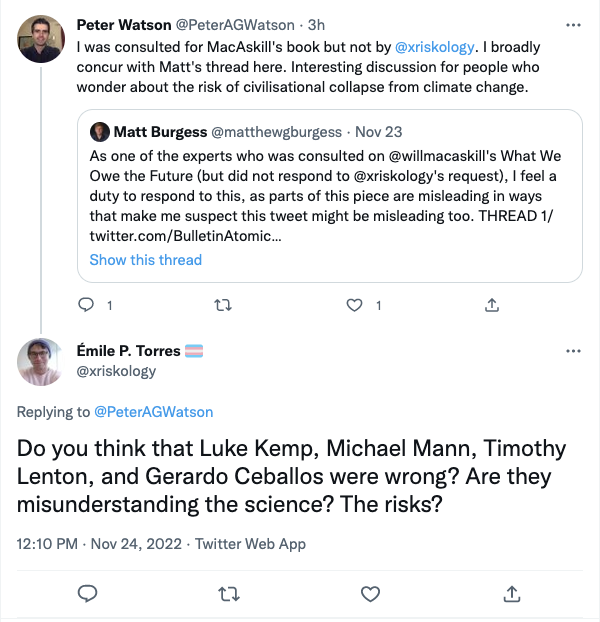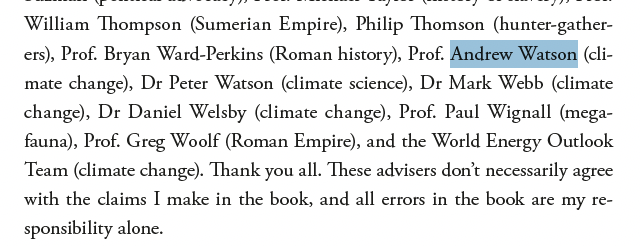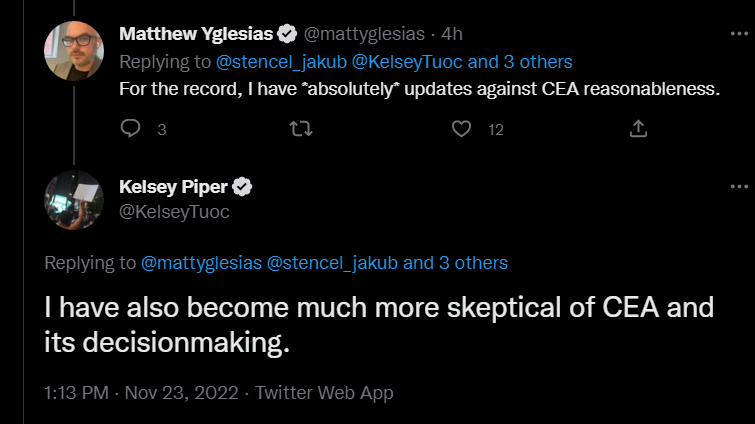Tldr: This is a letter I wrote to the Climate Contributing Editor of the Bulletin Atomic Scientists, Dawn Stover, about Emile Torres' latest piece criticising EA. In short:
- In advance of the publication of the article, Ms Stover reached out to us to check on what Torres calls their most "disturbing" claim viz. that Will MacAskill lied about getting advice from five climate experts.
- We showed them that this was false.
- The Bulletin published the claim anyway, and then tweeted it.
- In my opinion, this is outrageous, so I have asked them to issue a correction and an apology.
Update: The Bulletin has declined to correct the piece or issue an apology. They say that the editor's note provides 'balance' for the reader. They haven't explained how their false tweet remains acceptable. By these standards, media outlets don't have to correct false claims in articles, they just have to include editor's notes contradicting the false claims. There are apparently no constraints on what media outlets are permitted to tweet.
Dear Ms Stover,
I have long admired the work of the Bulletin of the Atomic Scientists. However, I am extremely disappointed by your publication of the latest piece by Emile Torres.
I knew long ago that Torres would publish a piece critical of What We Owe the Future, and on me following my report on climate change. However, I am surprised that the Bulletin has chosen to publish this particular piece in its current form. There are many things wrong with the piece, but the most important is that it accuses Will MacAskill and his research assistants of research misconduct. Specifically, Torres contends that five of the climate experts we listed in the acknowledgements for the book were not actually consulted.
Ms Stover: you contacted us about this claim in advance of the article’s publication, and we informed you that it was not true. Overall, we consulted around 106 experts in the research process for What We Owe The Future. Torres suggests that five experts were never consulted at all, but this is not true — as Will stated in his earlier email to you, four of those five experts were consulted. I am happy to provide evidence for this. The article would have readers think that we made up the citations out of thin air. One of them was contacted but didn’t have time to give feedback, and was incorrectly credited in the acknowledgements, which we will change in future editions: this was an honest mistake. The Bulletin also went on to tweet the false claim that multiple people hadn’t been consulted at all.
The acknowledgements are also clear that we are not claiming that those listed checked and agreed with every claim in the book. Immediately after the acknowledgements of subject-matter experts, Will writes: “These advisers don’t necessarily agree with the claims I make in the book, and all errors in the book are my responsibility alone.”
To accuse someone of research misconduct is a very serious allegation. After you check it and find out that it is false, it is extremely poor form to let the claim go out anyway and then to tweet it. The Bulletin should issue a correction to the article, and to the false claim they put out in a tweet.
I also have concerns about the nature of Torres’ background work for article — they seemingly sent every person that was acknowledged for the book a misleading email, telling them that we lied in the acknowledgements, and making some reviewers quite uncomfortable.
To reiterate, I am very disappointed by the journalistic standards demonstrated in this article. I will be publishing something separately about Torres’ (as usual) misrepresented substantive claims, but the most serious allegation of research misconduct needs to be retracted and we need an apology.
(Also, a more minor point: it's not true that I am Head of Applied Research at Founders Pledge. I left that role in 2019.)
John




I agree with the overall statement that the Bulletin should not have published this article as it is and definitely should have not tweeted what it did. Yes, they owe you an apology but I also don't understand some of the claims in this letter and think that these (maybe?) exaggerated claims undermine your good arguments and the rightful question for an apology.
First, concerning this paragraph:
Where does this information come from? The twitter thread you link to does not claim that Torres' made the author of the thread uncomfortable, only that he choose to ignore the email. Furthermore, the mail Torres wrote to him does not claim that you lied in the acknowledgments.
Second, the Bulletin did add an annotation to the article, correcting the claim from Torres that several researchers were not consulted. Yes, the article still suggests heavily that they weren't and even with this annotation you get the impression that MacAskill was at least negligent in his research, but accusing the Bulletin of just lying regarding this, is also not true.
On your first question, several people Torres contacted reached out to us to tell us that they had a weird email from Torres, which made some of them uncomfortable. In some of the emails Torres repeated the false claim that we had essentially fabricated the acknowledgements.
Second, they annotated the article, but then tweeted the false claim! The claim should not be allowed to stay in the piece once they have checked it and found out that it is false. It's basic journalism. If they think we lied to them about consulting the experts, then they should say so explicitly. If they think the claim is false it is obvious that they should remove since it is an accusation of research misconduct.